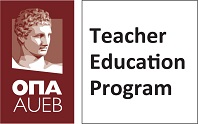The Program’s Philosophy
"What nobler employment, or more valuable to the state, than that of the man who instructs the rising generation?"
Marcus Tullius Cicero (106 B.C. - 43 B.C.)
Modern teaching directions at an international level are not covered by standardized teaching schemes and forms based simply on a theory. They overcome the four walls of the school classes, lead to horizons open to the "truth" and invite each time the teacher to a new teaching adventure. Human-centered teaching leads man to examine life, society, work, or the nature, in the most authentic way possible, and also leads to admiration, wonder, reflection and critical thinking.
In its philosophy, the Program examines new methods of teaching, new frameworks and new experiences that have nothing to do with the boredom of the everyday school routine. This reveals the other side of teaching, the lively, the creative and the more human. Through this philosophy, teacher-candidates are invited to learn, through experiential learning methods, the foundations, the way of organizing and the applications of modern teaching propositions with emphasis on values, so that they acquire the necessary qualifications for their employment in education.
The Program aims firstly to link "traditional pedagogy" to "modern pedagogy" and to offer to prospective students the ground for the development and use of progressive pedagogical frameworks and forms of teaching. The aim is to modernize the teachers’ knowledge and understanding on Pedagogy and Didactics through the transition from “the didactics of the object” to “the didactics of the subject” and backwards. Pedagogical education within the framework of the Program reflects the progressive-reforming side of modern teacher education.
"The dream begins with a teacher who believes in you,
who tugs and pushes and leads you to the next plateau, sometimes poking you with a sharp stick called truth."
Dan Rather, American journalist
Goals and Vision
The main aim of the curriculum of the TEP is to cultivate basic values, indispensable for the education of a teacher, such as respect, patience, stability, wisdom, sociability, responsibility, sincerity, trust, dialogue, tolerance, creativity, cooperation, compassion, generosity, friendship, freedom, justice and peace, through experiential learning activities.
It also seeks to cultivate emotional intelligence skills in students who attend it, so that they can respond to the needs and challenges of the 21st century through innovative thinking, especially in the field of Secondary Education. In addition, leadership and management skills as well as skills related to forming the learning environment of an educational unit are developed, in order to be able to generate authentic learning, aimed at the qualitative upgrading of Secondary Education and, in general, of formal and informal education.
The vision of the Program is to train innovative educators and future education managers, who will have the appropriate values, emotional intelligence and leadership skills and who will aim at becoming factors of managerial and educational creativity and innovation in the Greek educational system.
Goals
The curriculum further aims at achieving goals so that students, as prospective teachers, will:
- Understand that the teaching process is not based on a “recipe” but rather it is a creative process, a synthesis of science, art and technique.
- Discover and exploit the possibilities and limits of their freedom, as determined by modern pedagogy, by developing their emotional intelligence and by fostering innovative pedagogical thinking.
- Get into the basic structural features of teaching and the fundamental teaching methods that they can use to develop an effective teaching.
- Learn alternative teaching methods and modern teaching directions.
- Be able to build paths out of the school routine and of the standardized teaching by alternating the teaching setting, the means and the teaching methods. through their judgment.
- Practise their didactic skills in real school environments.
- Be informed about the use of ICT in the teaching process and to be able to make use of any other tool and possibility offered by modern technology in the teaching process.
- Cultivate key-values, indispensable for a teacher’s education, such as respect, patience, stability, prudence, sociability, responsibility, honesty, trust, dialogue, tolerance, creativity, cooperation, compassion, generosity, friendship, freedom, justice and peace, through experiential learning activities.




 76 Patission Str.
76 Patission Str.
